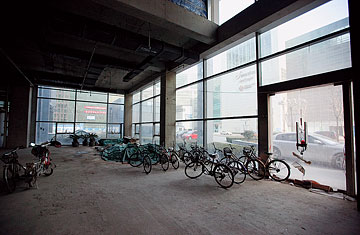
Empty promises
Beijing's vacant commercial space is a disquieting sign
(2 of 2)
Keep Your Fingers Crossed
When bubbles finally do burst, recent history has shown, they tend to do so with a bang. Is China, in fact, now at the end of its real estate boom? Many are not convinced. They point to a couple of factors that make China's situation different from that of the U.S. The first is that the real estate sector is nowhere near as reliant on debt financing as it is in the U.S. and much of the rest of the developed world. Consider the complex in which Yang, the cabbie, bought one of his three Shanghai apartments. The developer, Shanghai Forte Land, presold all the units before spending a cent on construction. In China's residential market, financing development with customers' cash, not loans, is standard operating procedure.
Nor, among home buyers in China, is there a significant amount of debt financing. According to Patrick Chovanec, a professor at Beijing's Tsinghua University who studies the Chinese real estate sector, only about 50% of residential purchases are made using mortgages. The other half are paid for in full at the time of acquisition. (In the U.S., by contrast, over 90% of residential housing transactions are financed with mortgages.) One of the reasons for this is that, just like Yang, many Chinese have been moved out of formerly state-owned housing units in urban areas as part of redevelopment projects. The compensation payments, supplemented by some savings, are usually enough to buy decent apartments out of town. Economist Xie calls these resettlement payments "probably the most important government action supporting today's economy." And the fact is, Chinese municipalities are not even close to the end of such resettlement schemes.
Another critical factor underpinning the residential real estate market is formed by the psychology of the Chinese home buyer in combination with regulatory restraints on what they can do with their savings. Just 34 years out of the chaos of the Cultural Revolution, and less than 15 years down the road from a nasty bout of inflation — consumer prices rose a staggering 21% in 1994 — the Chinese regard real estate as vital security (what Tsinghua's Chovanec calls the "bar of gold" syndrome). Yang says he hasn't even tried to rent out two of his three apartments because "it's not that important to gain income from them; there is security in just owning them. They are paid for, and I know that if I ever get into any kind of economic trouble I can sell them. That's real security."
Buttressing that sort of attitude are the limited ways in which Chinese citizens can put their nest eggs to work. Bank interest rates remain regulated and miserly — offering less than 1% return on a standard savings account — and China has only just begun to open the door to its citizens being able to invest legally abroad. For most savers, that leaves real estate or the stock market — and if an apartment is the equivalent of a bar of gold, the stock market is the equivalent of a casino. Generally speaking, the Chinese love to gamble, but they love their bars of gold more.
None of this means, of course, that the market is safe. Indeed, people caught up in a bubble typically offer seemingly solid reasons as to why the bubble won't burst. In Tokyo in the early 1990s, it was said that property prices wouldn't crash because in mountainous Japan there was so little usable land relative to size of the population. That was, and remains, a topographical fact. It was also, eventually, irrelevant.
During his opening address to the NPC, Premier Wen said that 2010 was going to be a year of unprecedented economic complexity. He certainly got that right. A real estate downturn, perhaps a severe one, will hit China sooner or later. The problem is that if it arrives sooner, the world's fastest-growing economy doesn't have a whole lot to fall back on. Its export markets are still weak and its capacity to increase infrastructure spending again, after the massive increases of the past two years, is limited. With the rest of the world still trying to regain its economic footing, the authorities in Beijing are hoping they can shrink a bubble without bursting it entirely. Delicate business, that. And it's not just the Chinese homeowner who should be praying that they can pull it off.
